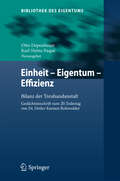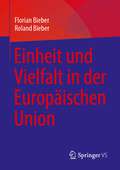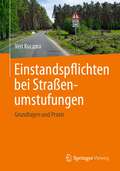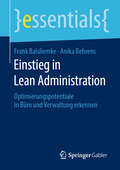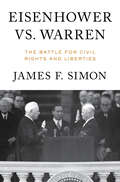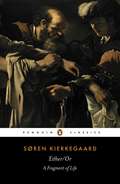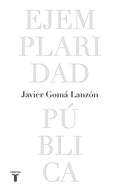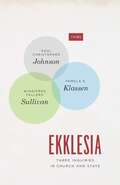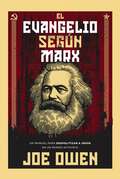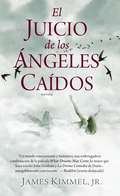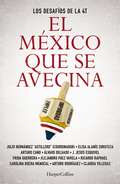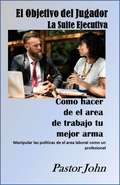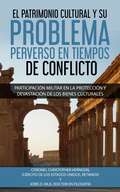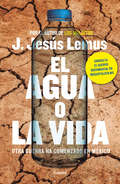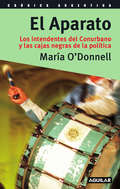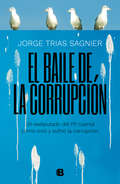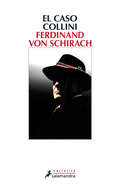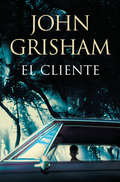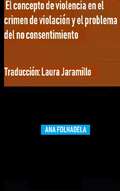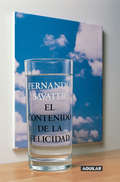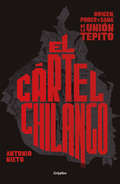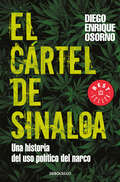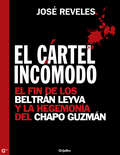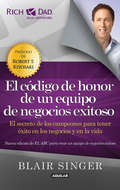- Table View
- List View
Einheit - Eigentum - Effizienz
by Otto Depenheuer Karl-Heinz PaquéDie Treuhandanstalt hatte im Zuge der deutschen Wiedervereinigung eine ebenso unverzichtbare wie undankbare Aufgabe. Als Institution hatte sie eine ebenso neue wie gigantische Aufgabe zu bewältigen: ohne historisches Vorbild, ohne theoretische Blaupausen, unter extremem Zeitdruck und hochfliegenden Erfolgserwartungen musste sie in schwierigster Zeit die wesentlichen Weichen stellen für die Transformation einer ganzen Volkswirtschaft durch Privatisierung und Sanierung der staatlichen Betriebe in den Beitrittsländern. In der Rückschau stellt sich die Arbeit der Treuhandanstalt als ein brillantes Bravourstück deutscher Verwaltungskompetenz dar, ein mustergültiges Beispiel für die Kraft der Improvisation und des Mutes, für Erfindungsreichtum, Tatkraft sowie das Engagement der Beteiligten. Der 20. Todestag von Detlev Karsten Rohwedder, dem ersten Präsidenten der Treuhandanstalt, bot den Anlass für eine Gedenkveranstaltung, die am 1. April 2011 im Bundesministerium der Finanzen stattfand, um seiner Persönlichkeit zu gedenken, seine Leistungen für die wirtschaftliche Wiedervereinigung Deutschlands zu würdigen, aber auch um eine wissenschaftliche Bilanz der Arbeit der Treuhandanstalt aus rechtlicher und wirtschaftlicher Sicht zu ziehen.
Einheit und Vielfalt in der Europäischen Union
by Florian Bieber Roland BieberIn diesem Buch wird untersucht, wie die Europäische Union auf die Herausforderung der Vielfalt reagiert hat. Dabei wird die EU als ein komplexes Gemeinwesen betrachtet, das neue Wege gefunden hat, um der Vielfalt gerecht zu werden. Ein Großteil der Literatur über die EU versucht, sie als einen einzigartigen Fall von Zusammenarbeit zwischen Staaten zu identifizieren, der über die klassische internationale Zusammenarbeit hinausgeht. In diesem Band wird argumentiert, dass es für das Verständnis der Bemühungen der EU um den Umgang mit der Vielfalt unter ihren Mitgliedern und Bürgern effektiver ist, die EU als Staat zu betrachten. Die Autoren räumen zwar ein, dass der EU wichtige Aspekte der Staatlichkeit fehlen, zeigen aber, dass die Betrachtung der Bemühungen der EU um ein Gleichgewicht zwischen Vielfalt und Einheit durch die Brille der Staatspolitik ein fruchtbarer Weg ist, um die Union zu verstehen. Anstatt die EU als etwas Unvergleichliches und Einzigartiges zu begreifen, das weder eine internationale Organisation noch ein Staat ist, wird in dem Buch argumentiert, dass die EU als ein Gemeinwesen verstanden werden kann, das viele Ansätze und Strategien mit komplexen und vielfältigen Staaten teilt. Die Bemühungen der EU um den Aufbau politischer Strukturen, die der Vielfalt Rechnung tragen, bieten somit Lehren für andere politische Systeme. Die Erfahrungen der EU tragen dazu bei zu verstehen, wie Staaten und andere Gemeinwesen auf die Herausforderungen der Vielfalt reagieren können, einschließlich der Vielfalt der konstituierenden Einheiten oder der subnationalen Gruppen und Identitäten.
Einstandspflichten bei Straßenumstufungen: Grundlagen und Praxis
by Veit KuczoraDer Lebenszyklus einer Straße besteht aus Planen, Bauen und Betreiben. Die zu beachtenden Vorgaben und Rahmenbedingungen reichen über unterschiedlichste Fachgebiete und erfordern die Zusammenarbeit verschiedenster Spezialisten und Generalisten. Jede Straße stellt aufgrund ihrer raumordnerischen Funktion, ihrer bautechnischen Einordnung in der Landschaft und ihrer verkehrstechnischen und –rechtlichen Ausstattung ein Unikat dar. Eine Besonderheit im Lebenszyklus einer Straße ist der Wechsel der Baulastträgerschaft. Unter welchen Voraussetzungen und Rechtsanwendungen eine Umstufung von Straßen erfolgt, ist maßgeblich von straßenrechtlichen und raumordnerischen Belangen abhängig und nicht Gegenstand des vorliegenden Buches. Als rechtliche Voraussetzung für die Betrachtungen innerhalb des Buches wird eine rechtskräftige Umstufung angenommen. Es sollen somit die Fragen, die bei der Abwicklung der Rechtsfolgen einer Umstufung in Form der Einstandspflicht auftreten, beantwortet werden. Dabei steht die Verzahnung von straßenrechtlichen, bautechnischen und verwaltungstechnischen Aspekten im Vordergrund. Zielgruppen des Buches sind daher Studenten in bau- und verwaltungstechnischen Studiengängen sowie Ingenieure und Entscheidungsträger in Verwaltungen und Ingenieurbüros.
Einstieg in Lean Administration: Optimierungspotentiale in Büro und Verwaltung erkennen (essentials)
by Frank Balsliemke Anika BehrensLean Management ist ein seit Jahren anerkannter Ansatz zur kontinuierlichen Verbesserung von Prozessen. In Produktion und Logistik vieler Unternehmen der verschiedensten Branchen ist das Thema nahezu selbstverständlich geworden. Im indirekten Bereich aber, in Büro und Verwaltung, ist die Philosophie des Lean Office oder der Lean Administration bisher kaum verbreitet oder sogar völlig unbekannt. Dieser Band bietet einen kompakten Einstieg in das Thema und stellt einige Grundlagen und erste typische Methoden und Ansätze aus Wissenschaft und Praxis vor. Es wird aufgezeigt, dass Lean Administration nicht einfach nur eine weitere Methode zur Prozessoptimierung ist. Vielmehr handelt es sich um eine grundsätzliche Denk- und Verhaltensweise, die die gesamte Unternehmenskultur verändern kann.
Eisenhower vs. Warren: The Battle For Civil Rights And Liberties
by James F. SimonThe epic 1950s battle that would shape the legal future of the civil rights movement is chronicled here for the first time. The bitter feud between President Dwight D. Eisenhower and Chief Justice Earl Warren framed the tumultuous future of the modern civil rights movement. Eisenhower was a gradualist who wanted to coax white Americans in the South into eventually accepting integration, while Warren, author of the Supreme Court’s historic unanimous opinion in Brown v. Board of Education, demanded immediate action to dismantle the segregation of the public school system. In Eisenhower vs. Warren, two-time New York Times Notable Book author James F. Simon examines the years of strife between them that led Eisenhower to say that his biggest mistake as president was appointing that “dumb son of a bitch Earl Warren.” This momentous, poisonous relationship is presented here at last in one volume. Compellingly written, Eisenhower vs. Warren brings to vivid life the clash that continues to reverberate in political and constitutional debates today.
Either/Or: A Fragment of Life
by Soren KierkegaardIn Either/Or, using the voices of two characters - the aesthetic young man of part one, called simply 'A', and the ethical Judge Vilhelm of the second section - Kierkegaard reflects upon the search for a meaningful existence, contemplating subjects as diverse as Mozart, drama, boredom, and, in the famous Seducer's Diary, the cynical seduction and ultimate rejection of a young, beautiful woman. A masterpiece of duality, Either/Or is a brilliant exploration of the conflict between the aesthetic and the ethical - both meditating ironically and seductively upon Epicurean pleasures, and eloquently expounding the noble virtues of a morally upstanding life.
Ejemplaridad pública (edición conmemorativa con prólogo del autor)
by Javier Gomá LanzónTaurus recupera Ejemplaridad pública, el libro de filosofía más emblemático de los últimos años, para conmemorar el décimo aniversario de su publicación. Este libro defiende la ejemplaridad, igualitaria y secularizada, como principio organizador de la democracia moderna en la convicción de que, en esta época postnihilista, en la que autoritarismo y coerción han perdido su poder cohesionador, solo la fuerza persuasiva del ejemplo virtuoso, generador de costumbres cívicas, es capaz de promover la auténtica emancipación del ciudadano. La crítica opina:«Un soplo de aire fresco. Sacude las sombras de las antiguas tradiciones con la claridad de un arroyo de montaña. Ofrece también una nueva visión, perspicaz y necesaria, de los futuros posibles. Insuflará nueva vida a nuestra perpetua búsqueda de sentido.»Zygmunt Bauman «De lejos el intelectual español más interesante y profundo del momento, una especie de hombre del Renacimiento.»Joseph Weiler «Uno de los intelectuales públicos más distinguidos de España. Una propuesta audaz y atractiva que contribuye a revitalizar la filosofía y enriquecer la vida cívica de las sociedades democráticas.»Michael Sandel «A veces pienso que una buena antología de los textos de Gomá o, por qué no, todos ellos, podrían figurar como adenda de la misma Constitución una vez que sea revisada.»César Antonio De Molina «Un fenómeno dentro del pensamiento español actual.»Javier Rodríguez Marcos, El País «Una de las obras mayores para quienes se toman en serio la crisis política actual, que es moral.»J.M. Ureña, El Periódico «El capítulo "La auténtica fuente de moralidad social" deberían ponerlo en las paradas del bus y del metro.»Luis Algorri, Tiempo «En este ambiente de cinismo generalizado no puede ser más oportuno este libro.»Germán Cano, La Razón «Admirable ensayo.»Félix de Azúa «Un éxito fulgurante.»Manuel Barrios, El Cultural «Como nos recuerda el brillante filósofo español Javier Gomá Lanzón, la educación moral se da mediante el poder del ejemplo.»David Brooks, The New York Time «Javier Gomá medita sobre un tiempo geológico -el filosófico- sin renunciar a observar urgencias del presente. Se apropia de conceptos caídos en desuso y los rellena con savia nueva.»Tereixa Constenla, El País «Un hombre cuya formación lo convierte en una espléndida rareza dentro del ámbito del nuevo pensamiento español.»ABC «Javier Gomá se ha convertido con todo merecimiento en una destacada figura del panorama intelectual español.»El Cultural «Un pensador en alza.»El Mundo «El filósofo Javier Gomá es el pensador de moda.»Babelia
Ekklesia: Three Inquiries in Church and State (TRIOS)
by Winnifred Fallers Sullivan Pamela E. Klassen Paul Christopher JohnsonEkklesia: Three Inquiries in Church and State offers a New World rejoinder to the largely Europe-centered academic discourse on church and state. In contrast to what is often assumed, in the Americas the relationship between church and state has not been one of freedom or separation but one of unstable and adaptable collusion. Ekklesia sees in the settler states of North and South America alternative patterns of conjoined religious and political power, patterns resulting from the undertow of other gods, other peoples, and other claims to sovereignty. These local challenges have led to a continuously contested attempt to realize a church-minded state, a state-minded church, and the systems that develop in their concert. The shifting borders of their separation and the episodic conjoining of church and state took new forms in both theory and practice. The first of a closely linked trio of essays is by Paul Johnson, and offers a new interpretation of the Brazilian community gathered at Canudos and its massacre in 1896–97, carried out as a joint churchstate mission and spectacle. In the second essay, Pamela Klassen argues that the colonial churchstate relationship of Canada came into being through local and national practices that emerged as Indigenous nations responded to and resisted becoming “possessions” of colonial British America. Finally, Winnifred Sullivan’s essay begins with reflection on the increased effort within the United States to ban Bibles and scriptural references from death penalty courtrooms and jury rooms; she follows with a consideration of the political theological pressure thereby placed on the jury that decides between life and death. Through these three inquiries, Ekklesia takes up the familiar topos of “church and state” in order to render it strange.
El Evangelio según Marx: Un manual para despolitizar a Jesús en un mundo activista
by Joe OwenDescubre cómo discernir entre la verdad bíblica y las ideologías culturales que están infiltrando la iglesia, para que puedas vivir tu fe con claridad y convicción en medio de un mundo confuso y politizado.En el siglo veinte, dos ideas opuestas destacaban en Occidente: las enseñanzas de Jesucristo y la versión de una utopía inspirada por Karl Marx. Ahora, en el siglo veintiuno, estas ideas están extrañamente mezcladas tanto en la cultura como dentro de la Iglesia.El autor Joe Owen entrega un examen oportuno de cómo el pensamiento marxista ha infiltrado las comunidades de fe modernas. Este manual integral te equipa para reconocer y responder a las maneras sutiles en que las cosmovisiones seculares desafían los fundamentos bíblicos.Lo que descubrirás:Herramientas prácticas para pastores, líderes y creyentes navegando las presiones culturalesRespuestas bíblicas a la teoría crítica de la raza, ideología de género y movimientos de justicia socialFundamentos teológicos para entender la naturaleza humana, el pecado y la redención por medio de CristoLas raíces históricas de cómo la ideología marxista evolucionó de teoría económica a revolución cultural¿Listo para reclamar la verdad bíblica?Transforma tu comprensión de cómo vivir fielmente en un mundo cegado por las tinieblas. Redescubre el poder radical del cristianismo auténtico que trasciende las ideologías humanas.Disponible en formato de tapa blanda, libro electrónico y audiolibro para tu conveniencia. The Gospel According to MarxDiscover how to discern between biblical truth and cultural ideologies that are infiltrating the church, so that you can live your faith with clarity and conviction in the midst of a confusing and politicized world.In the twentieth century, two opposing ideas stood out in the West: the teachings of Jesus Christ and Karl Marx's version of utopia. Now, in the twenty-first century, these ideas are strangely mixed both in culture and within the Church.Author Joe Owen provides a timely examination of how Marxist thinking has infiltrated modern faith communities. This comprehensive handbook equips you to recognize and respond to the subtle ways in which secular worldviews challenge biblical foundations.What you will discover:Practical tools for pastors, leaders, and believers navigating cultural pressuresBiblical responses to critical race theory, gender ideology, and social justice movementsTheological foundations for understanding human nature, sin, and redemption through ChristThe historical roots of how Marxist ideology evolved from economic theory to cultural revolutionReady to claim biblical truth?Transform your understanding of how to live faithfully in a world blinded by darkness. Rediscover the radical power of authentic Christianity that transcends human ideologies.Available in paperback, e-book, and audiobook formats for your convenience.
El Juicio de los ángeles caídos
by James Kimmel Jr.More information to be announced soon on this forthcoming title from Penguin USA.
El México que se avecina: Los desafíos de la 4T.
by Thomas NelsonAt the end of 2019, in the province of Wuhan, health alerts were lit after the appearance of a new virus similar to influenza but with a dizzying speed of contagion was reported. Within months, the entire world faced one of the worst health crises in all of history. In this context, Julio Hernández has been in charge of convening a group of journalists who, based on a meticulous investigation, interview and analysis, offer a panorama to understand the challenges and reconstruction that the country will have to face in health matters , economy, employment, security, bilateral relations, media and communication in the reconstruction of Mexico that is coming.A finales de 2019, en la provincia de Wuhan, se encendieron las alertas sanitarias tras reportarse la aparición de un nuevo virus similar a la influenza, pero con una velocidad de contagio vertiginosa. En unos meses, el mundo entero enfrentó una de las peores crisis de salud de toda la historia. En este contexto, Julio Hernández se ha encargado de convocar a un grupo de periodistas que, a partir de la investigación meticulosa, la entrevista y el análisis, ofrecen un panorama para entender los desafíos y la reconstrucción que el país deberá enfrentar en temas de salud, economía, empleo, seguridad, relación bilateral, medios y comunicación en la reconstrucción del México que se avecina.
El Objetivo del Jugador: La Suite Ejecutiva
by Martha Mauri Pastor JohnPara ganar en la vida, incluso en los negocios, es necesario que sepas quién eres, qué has hecho o qué ha hecho alguien para ayudarte a definir quién eres y diseñar quién debe ser para que tu empresa funcione a tu favor. Tu lugar de trabajo puede ser una iglesia, un almacén, un centro comercial o las oficinas principales de un conglomerado internacional. La gente lo dirige. ¿Puedes ser una de estas personas? Eres inteligente y hábil, pero ¿eres eficiente? Tu CEO es el jugador entre iguales; elegido por sus iguales. El Jugador entre los jugadores astutos con la espada aún desenvainada. ¿Estás en la lista de El Jugador de a quién vigilar? Objetivo del Jugador: la Suite Ejecutiva lo ayuda a comprender la forma en que la política eficaz de las personas mejora tus habilidades para convertir la ambición en un logro. Siempre se trata de personas. Este libro te enseña cómo las personas te impulsan a la suite ejecutiva y te mantienen allí. Es posible que nunca hayas pensado en ser el CEO, la inspiración se inicia aquí. Si alguna vez pensaste que eres lo bastante inteligente, he aquí un espejo, una lista de verificación para tu evaluación. Los CEO también cultivan a sus reemplazos: ¿mi lista coincide con la tuya? Es hora de descubrir quiénes son los prospectos frente a los verdaderos jugadores. Tienes que jugar para ganar, pero solo EL Jugador gana siempre.
El Patrimonio Cultural y su Problema Perverso en Tiempos de Conflicto: Participación militar en la protección y devastación de bienes culturales
by Christopher V. HerndonLa herencia cultural del mundo se encuentra en la actualidad amenazada no solamente por el transcurrir del tiempo, las inclemencias de la naturaleza y el desarrollo humano, sino también cada vez más por los conflictos armados. Presenciamos la destrucción causada no solamente por los saqueos y el tráfico ilícito, sino por la iconoclasia y por la manipulación de la herencia cultural por motivos religiosos, económicos y propagandísticos. Las ganancias provenientes de la venta ilegal son a menudo utilizadas para financiar los conflictos tal como se ilustra en el modelo de negocios de Da’esh que se utiliza como ejemplo en esta publicación. La Protección de la Propiedad Cultural (PPC), aunque es de obligatorio cumplimiento bajo los estamentos legales nacionales e internacionales, es implementada muy pobremente y las sanciones por su incumplimiento son muy rara vez aplicadas. Sin embargo, existe una constante demanda no solo local sino internacional para aumentar los niveles educativos e incrementar la investigación multidisciplinaria sobre el tópico, en particular en el contexto del conflicto y el crimen organizado. La investigación académica debe incluir las perspectivas militares, y también los mecanismos que conectan tanto al abuso como a su protección. Los resultados deberían contener una conceptualización académica, así como soluciones fundamentadas en la práctica de manera de disminuir y mitigar los daños. Los autores escribieron esta publicación para satisfacer la demanda de información actualizada sobre este tema y al mismo tiempo para intensificar y dar seguimiento a su trabajo previo: Involucración Militar en la Protección de la Propiedad Cultural: Una Reseña. (Trabajo publicado en la Joint Force Quarterly, JFQ 74, 3rd Quarter 2014 July 2014). Este nuevo trabajo incluye una selección de estudios de caso utilizados como ejemplo e incorpora desarrollos y tendencias recientes. Todos estos ingredientes sirven para alimentar la i
El agua o la vida (Colección Vital): Otra guerra ha comenzado
by J. Jesús LemusHace años se temía que las guerras venideras fueran por el agua: el futuro nos alcanzó. El crimen organizado se convirtió en instrumento disuasivo de la movilización social. Hoy, en México, hay 916 batallas por el agua. Gobierno, empresas y delincuentes se han movilizado contra las poblaciones y los activistas en busca de su bien más preciado. Ya hay miles y miles de víctimas, y el cambio climático las multiplicará. En esta investigación periodística vienen los nombres y apellidos de los responsables, las redes de corrupción y los modus operandi. pero el desastre aún puede frenarse.
El aparato
by María O'DonnellEn un círculo vicioso, el mal ejercicio de la política desvía fondos de los gobernados hacia el mantenimiento de la maquinaria que impondrá a algunas de las figuras que los gobernarán, quienes al llegar al poder reproducirán el mecanismo que mantiene en cruel crisis el sistema partidario argentino. El Aparato describe las piezas de esa maquinaria y explica cómo afecta su funcionamiento al ciudadano común. En un círculo vicioso, el mal ejercicio de la política desvía fondos de los gobernados hacia el mantenimiento de la maquinaria que impondrá a algunas de las figuras que los gobernarán, quienes al llegar al poder reproducirán el mecanismo que mantiene en cruel crisis el sistema partidario argentino. El Aparato describe las piezas de esa maquinaria y explica cómo afecta su funcionamiento al ciudadano común.
El baile de la corrupción
by Jorge Trías SagnierJorge Trias Sagnier, exdiputado del PP, cuenta cómo vivió y sufrió la corrupción desde dentro del partido. El exdiputado del PP Jorge Trias Sagnier cuenta lo que vivió después de que el segundo juez instructor del caso Gürtel le pidiera que transmitiese a Rajoy y a la cúpula del PP que no interfirieran en la instrucción abierta. Trias Sagnier desempeñó un papel importante porque, al desvelar en un artículo publicado en El País la contabilidad B del Partido Popular, hizo que estallase uno de los mayores escándalos de corrupción de la democracia española. Un escándalo que nadie ha contado desde dentro, hasta ahora. El baile de la corrupción muestra el caso Gürtel y sus derivaciones a través de lo que Trias Sagnier vio por estar en contacto directo con Luis Bárcenas y la cúpula del partido. Al hacerlo, expone la intimidad de nuestra vida política y nos ayuda a comprender cómo actúan personajes de la relevancia de Rajoy, Aznar, Bárcenas, Trillo o Arenas, jueces como Garzón o algunos magistrados del Tribunal Supremo. Estamos, pues, ante un libro valiente y de interés general porque revela, de primera mano, el juego político del PP. «Hay situaciones en la vida de las que no te puedes desentender, te acompañan siempre. Y el hecho de haber participado en política es una de ellas. En mi caso, la trama Gürtel, con todo su complejo entramado jurídico y político, ya no me abandonaría nunca. Por más que quisiera alejarme, esta historia que me había mostrado con toda crudeza la cueva más oscura del Partido Popular, la cara más cruel y mezquina de la política, no quería soltarme. Sabía demasiado. Ya no tenía marcha atrás.»Jorge Trias Sagnier
El baile de la corrupción
by Jorge Trías SagnierJorge Trias Sagnier, exdiputado del PP, cuenta cómo vivió y sufrió la corrupción desde dentro del partido. El exdiputado del PP Jorge Trias Sagnier cuenta lo que vivió después de que el segundo juez instructor del caso Gürtel le pidiera que transmitiese a Rajoy y a la cúpula del PP que no interfirieran en la instrucción abierta. Trias Sagnier desempeñó un papel importante porque, al desvelar en un artículo publicado en El País la contabilidad B del Partido Popular, hizo que estallase uno de los mayores escándalos de corrupción de la democracia española. Un escándalo que nadie ha contado desde dentro, hasta ahora. El baile de la corrupción muestra el caso Gürtel y sus derivaciones a través de lo que Trias Sagnier vio por estar en contacto directo con Luis Bárcenas y la cúpula del partido. Al hacerlo, expone la intimidad de nuestra vida política y nos ayuda a comprender cómo actúan personajes de la relevancia de Rajoy, Aznar, Bárcenas, Trillo o Arenas, jueces como Garzón o algunos magistrados del Tribunal Supremo. Estamos, pues, ante un libro valiente y de interés general porque revela, de primera mano, el juego político del PP. «Hay situaciones en la vida de las que no te puedes desentender, te acompañan siempre. Y el hecho de haber participado en política es una de ellas. En mi caso, la trama Gürtel, con todo su complejo entramado jurídico y político, ya no me abandonaría nunca. Por más que quisiera alejarme, esta historia que me había mostrado con toda crudeza la cueva más oscura del Partido Popular, la cara más cruel y mezquina de la política, no quería soltarme. Sabía demasiado. Ya no tenía marcha atrás.»Jorge Trias Sagnier
El caso Collini
by Ferdinand von SchirachEl caso Collini, que narra una historia criminal de una concisión y una desnudez sobrecogedoras, suscitó un encendido debate al revelar la existencia de grandes deficiencias de la justicia en Alemania. Primera novela de Ferdinand von Schirach -conocido por sus extraordinarios volúmenes de relatos Crímenes y Culpa-, El caso Collini suscitó un encendido debate sobre el funcionamiento de la justicia en Alemania y el libro, como sus dos anteriores, ocupó los primeros puestos en las listas de ventas en su país. Empleado diligente, de una discreción modélica, Fabrizio Collini trabajó como operario durante treinta y cuatro años en la Mercedes-Benz. Pero un día, ya jubilado, acude al legendario Hotel Adlon de Berlín, a dos pasos de la puerta de Brandenburgo, y asesina a sangre fría a un hombre anciano, sin motivo aparente. La defensa de Collini recae de oficio en el joven e inexperto abogado CasparLeinen, y lo que al principio parece una oportunidad para su incipiente carrera se convierte en un acuciante dilema profesional, ya que la víctima, un conocido y respetado empresario, es el abuelo de su primer amor, quien a su vez reaparece después de tantos años para pedirle que renuncie al caso. Así pues, Leinen no sólo se ve obligado a defender a un hombre que renuncia a defenderse y se niega a revelar el motivo del crimen, sino también debe resolver el conflicto de intereses. Su reputación y su carrera están en juego, más aún cuando el hallazgo de una pista apunta a un inquietante capítulo de la historia de la justicia alemana. La crítica ha dicho...«Von Schirach es capaz de atrapar al lector desde las primeras líneas y no soltarlo hasta la última página [...]. Su poder narrativo es irresistible.»La Repubblica «Es una pequeña joya: sagaz, incisiva y provocadora.»The Guardian «Un narrador magnífico.»Der Spiegel «Schirach tiene la lucidez de un jurista y el temperamento de un escritor de novela negra.»La Stampa «Escrita con un estilo sobrio y contenido que resulta extremadamente convincente. Von Schirach invita al lector a plantearse qué es la justicia.»The Scotsman
El cliente
by John GrishamIn a weedy lot on the outskirts of Memphis, two boys watch a shiny Lincoln pull up to the curb. . . Eleven-year-old Mark Sway and his younger brother were sharing a forbidden cigarette when a chance encounter with a suicidal lawyer left Mark knowing a bloody and explosive secret: the whereabouts of the most sought-after dead body in America. Now Mark is caught between a legal system gone mad and a mob killer desperate to cover up his crime. And his only ally is a woman named Reggie Love, who has been a lawyer for all of four years. Prosecutors are willing to break all the rules to make Mark talk. The mob will stop at nothing to keep him quiet. And Reggie will do anything to protect her client -- even take a last, desperate gamble that could win Mark his freedom. . . or cost them both their lives.
El concepto de violencia en el crimen de violación y el problema del no consentimiento: Tesis de Maestría en Derecho
by Ana FolhadelaSinopsis El concepto de violencia en el crimen de violación y el problema del no consentimiento es un libro técnico-jurídico, basado en la tesis de maestría de la autora, defendido el 25 de marzo del 2015, en la Universidade Católica do Porto. El libro trata del problema de la interpretación del concepto de violencia en el crimen de violación, limitando el análisis a los crímenes practicados en víctimas adultas. Se pretende demostrar, con base en el análisis, principalmente, las consecuencias de la práctica del crimen para las víctimas y las motivaciones de los agresores sexuales; y que la práctica de este crimen es suficiente para la actuación sin el consentimiento de la víctima, una vez que la conducta sin consentimiento es en sí misma violenta, defendiendo incluso la exigencia de otros o de distintos tipos de violencia, para concluir que la existencia del crimen refleja una práctica discriminatoria del género. La elaboración de esta tesis se basó (siendo parcialmente idéntica, con un mayor desarrollo de la parte jurídica) en un trabajo anterior de la misma autora intitulado “El carácter discriminatorio de la exigencia de otras formas de violencia además de la actuación sin el consentimiento de la víctima para efectos del cumplimiento del crimen de violación”, al cual se le atribuyó, en noviembre del 2014, el Premio “Teresa Rosmaninho Direitos Humanos/Derechos de la Mujeres” (2ª edición/2014).
El contenido de la felicidad: Un Alegato Reflexivo Contra Supersticiones Y Resentimientos (Taurus Bolsillo Ser. #Vol. 32)
by Fernando SavaterUn alegato reflexivo contra supersticiones y resentimientos. «Que otros se ocupen de fijar el papel que la ética debe desempeñar en la vida; a mí lo que me preocupa es el puesto que la vida ha de tener en la ética. ¿Arte de vivir, camino de felicidad? ¿Responder a la voz del otro, responsabilizarse? ¿Instinto, sentimiento o cálculo? ¿Esfuerzo heroico o malicia irónica? Pasen y vean.»Fernando Savater
El cártel chilango: Origen, poder y saña de la Unión Tepito
by Antonio NietoEn el corazón de la capital de México -la ciudad que alguna vez estuvo "prohibida" para los capos del narco- nació La Unión Tepito, el primer y único cártel chilango. No es una pandilla, no es una célula de un grupo mayor ni tampoco una banda doméstica, sino un auténtico cártel que logró apoderarse del centro del país, justo en las narices de las más altas autoridades. ¿Cómo lo hizo? Ejerciendo una violencia como nunca se había visto, con el liderazgo de un hombre del que poco o nada se sabía, con una red de lavado poderosísima y la apatía de dos administraciones capitalinas. Ningún trabajo periodístico había escarbado tan profundo en las entrañas de La Unión Tepito, en la personalidad de sus líderes, en las matanzas que ha perpetrado, en sus alianzas y sus impunidades. Con documentos altamente confidenciales, testimonios de víctimas, de ex miembros del cártel y acceso al contenido de teléfonos celulares de sus integrantes, este libro revela el verdadero rostro de La Unión, y el reguero de sangre y dinero sucio que ha dejado a su paso.
El cártel de Sinaloa
by Diego Enrique OsornoCrónica del surgimiento, desarrollo y transformaciones del Cártel de las drogas más peligroso de México. El cártel de Sinaloa explica y detalla el mundo del narco: desde los pioneros del negocio como Pedro Avilés, los sicarios desalmados que matan gobernadores como el Gitano, policías corruptos al estilo Guillermo González Calderoni, hasta hechos sorprendentes como la expulsión masiva de chinos durante la segunda década del siglo XX, las primeras rutas trasnacionales de la cocaína, o la fuga de Joaquín el Chapo Guzmán. Aquí todos cuentan su versión sobre el lucrativo tráfico de drogas en Sinaloa, que es la historia misma del narcotráfico en México. Este libro da voz al hijo de un narcotraficante que relata cómo es vivir con ese estigma; también aparece un abogado de la mafia que abre puertas de tribunales y prisiones de máxima seguridad; soldados oaxaqueños que erradican cultivos de mariguanaen la sierra de Badiraguato; un comandante guerrillero del ERPI en Guerrero, o un político y empresario millonario de San Pedro Garza García, Nuevo León. Todos ellos son piezas clave en el mundo del narco y aquí ofrecen testimonios reveladores. La PGR, la DEA y el Ejército mexicano lo hacen a través de expedientes oficiales, algunos publicados por primera vez en este libro. Se da a conocer asimismo la versión directa de capos como Miguel Ángel Félix Gallardo, el Jefe de Jefes, cuyos escritos de puño y letra acusan a las autoridades de ser las auténticas responsables de crear y organizar la distribución de los llamados cárteles. Diego Enrique Osorno, a través de una ágil narración periodística, nos ofrece el más completo panorama del cártel fundacional del narcotráfico y uno de los más poderosos que han existido en México.
El cártel incómodo: El fin de los Beltrán Leyva y la hegemonía del Chapo Guzmán
by José Reveles Morado"Si algo indigna a los mexicanos es observar cómo el gobierno se coloca al nivel de la vesania y agresividad de los criminales." José Reveles Cuerpos decapitados, "pozoleados", descuartizados; narcomantas, cartulinas y videos con mensajes de violencia o denuncias contra el gobierno por atacar sólo a unos traficantes y encubrir y consentir a otros; ataques armados a centros de adicción, a discotecas, a fiestas particulares de jóvenes; amenazante paramilitarismo. Todo forma parte del escenario de nuestra violenta cotidianidad desde que el gobierno federal le declaró la "guerra" al narcotráfico, pero sin emplear inteligencia policiaca o militar, sin desmantelar redes financieras, lavado de dinero y empresas fantasmas. Siguen intactas las estructuras políticas que brindan protección a la criminalidad. De eso y más habla El cártel incómodo: del surgimiento de los Beltrán Leyva y de por qué su rompimiento con el cártel de Sinaloa; delbrillo efímero de esta organización durante cinco años; de la muerte o la cárcel que los borró del mapa, con lo cual se fortaleció Joaquín el Chapo Guzmán, a quien ellos pretendían aniquilar. Todo esto apunta a favorecer la hegemonía del cártel de Sinaloa, hoy por hoy el cártel incómodo de los gobiernos panistas. José Reveles desnuda en estas páginas la verdad detrás del discurso oficial. Nos acerca al espejo de una terrible realidad que las élites política y económica no quieren mirar. Contiene los informes del Cisen que Alfredo Jiménez Mota, periodista de El imparcial de Hermosillo, utilizó en sus publicaciones antes de ser desaparecido en 2005.
El código de honor de un equipo de negocios exitoso.: El secreto de los campeones para tener éxito en los negocios y en la vida
by Blair SingerEl secreto de los campeones para tener éxito en los negocios y en la vida¡Mejora tus ventas, haz inversiones asertivas y logra un crecimiento vertical!La clave para impulsar tu empresa son las personas que conforman tu equipo de negociosEste libro es una guía paso a paso para cualquier individuo, grupo o empresa que quiera crear su propio código de honor. El código de honor de un equipo de negocios exitoso te enseñará cómo el proceso de creación de equipos es el eje central de los negocios, las inversiones, la iniciativa empresarial, e incluso la vida personal.El código de honor para un equipo de negocios exitoso brinda pasos específicos, ejemplos gráficos, historias y numerosos estudios de caso para que puedas:Crear tu propio código de honor. Aplicar y hacer cumplir el código de honor rápidamente.Utilizar el código para controlar el crecimiento en tu organización.Construir tu equipo de negocios con los jugadores adecuados.Aumentar el rendimiento de tu equipo.Usar la presión a tu favor para producir resultados extraordinarios.
